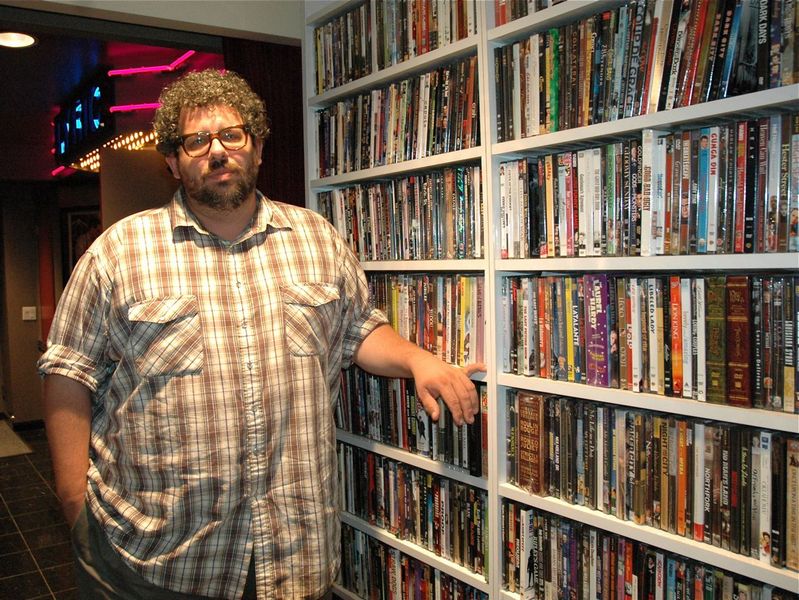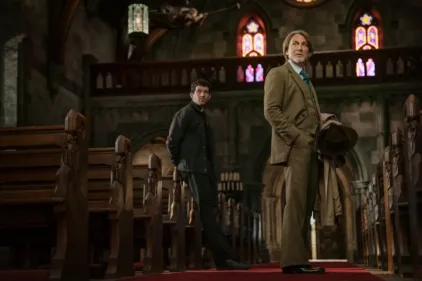Neil Labute made three tightly-wound films about Gender Wars, and now he’s made a fourth, “Lakeview Terrace,” with race added to the battlefield. Like his other films, it involves close scrutiny of the behavior of men in conflict and women in between. The movie opens Friday (Sept. 19).
This one is a thriller, on top of everything else. It stars Samuel L. Jackson as a black cop who doesn’t like it when an interracial couple moves in next door. He glowers out the window at a black wife (Kerry Washington) and her white husband (Patrick Wilson). And then he begins an alarming harassment, beginning with floodlights through their windows and building into psychological warfare
LaBute and I discussed the film one day in Chicago; he lives in the suburbs. “Actually, I think any number of actors from different races could have played that part,” he said. “But when we say race relations, we often tend to think black and white immediately. We start the film from Sam’s perspective. He’s not a bad cop, he’s a cop who has lived in the tinderbox of Los Angeles, trying to raise two children. It was important for him not to be just a bad guy. The producers were always looking at it as a thriller and we were trying to subvert the thriller by asking, how do we tell this from everybody’s side?”
It ends in a thriller situation nevertheless, but LaBute has prepared the ground so carefully that the climax seems justified, and still depends on psychology as much as a showdown. He doesn’t have a simplistic view of the characters. Washington and Wilson are happy together at the beginning, but Jackson’s hostility drives a wedge between them, with complex emotional results.
“if you watch the trailer,” he said, “you wouldn’t know what’s going on between Patrick and Kerri. But I think that’s a really satisfying side of the story — the pressure upon this young couple. That’s the kind of stuff that attracts me. There’s a scene we had to cut to get the PG-13 rating. They’ve moved in their stuff and we see them kissing and starting to make love, and then we cut to the night where they first see the lights outside. I thought it showed a solid bond between this couple. You remove that and you have precious little between them before the conflict starts.”
Enough, I think, to see they love each other. But is the husband ready to protect his home and marriage? LaBute said the Wilson character is “one of those guys I’ve focused on a lot, the boy-man who don’t want to grow up too quickly. From my point of view I think I was more interested in that. I wanted him to have a solid relationship which, because of the pressure from Jackson, starts to crumble. And I wanted the ending to be ambiguous. I didn’t want them to fall into each other’s arms. I didn’t cut to her in a conventional way. I stayed off her face. When he says, ‘We’re a family now,’ she doesn’t respond; she just looks at him and then the ambulance pulls away. I don’t think that you can go through something like that and a minute later, all is well. I mean, their life has been dumped upside down.”
LaBute created a similar boy-man situation in his first film, “In the Company of Men” (1997), where a dominant and aggressive male coerced a weaker male to join him in playing a cruel trick on a deaf girl. The weaker man and the girl began to like one another, and then the alpha male pulled out the rug, and the weak guy didn’t fight. This time, it’s not that simple, and there’s ambiguity even in the buried motives of the Jackson character. We get two possible, even plausible, explanations for his behavior, and they contradict each other.
I appreciate the ambiguity, I told him. It works like all of your films to pose moral puzzles for the audience.
“Yeah, I think that’s true. I hope so, anyway. I’m never as comfortable the day we’re smashing a car as when a man a woman start screaming at each other. I think I grew up around more people screaming at each other than cars crashing. That might be it. So I understand the battlefield a little better. But I’m just drawn to that world, that complex universe of people trying to get along with each other.”
“Take the question that’s posed by Rodney King, whose story began on a different Lakeview Terrace. Can’t we all just get along? I think the answer, as I came to making this movie was, just barely, and only if you work at it everyday. I think today it’s more acceptable to do whatever you feel like. People dispose of relationships more quickly. That we build a fence next to our neighbor. That we say, we should get a divorce. That we go online to meet people so that it’s easier to get rid of them when we’re through with them. All we do is just click a button and those people are gone. I think people don’t like to work as much to forge a good friendship, or good relationship. I think on a lot of levels this film wasn’t just about black and white but it was about blue collar vs. white collar, and men vs. women, and older vs. younger.”
Samuel L. Jackson‘s character has scary depths, I said.
“He comes with a sense of cool. It’s nice to see him play the bad guy, like in “Training Day.” And yet he brings a kind of a heartbreaking quality to it. he’s imposing, and it’s all for the good in most movies. But to see him turn that with just the flicker of an eye. I’ve seen a lot of Sam Jackson movies and there’s a moment where the husband finally confronts him and says, ‘You need to back off. You need to get out of my life.’ And Sam smiles at him and he has a face that I’ve never seen Sam do, and it just felt so scary. And the scene where he was in the bar, talking about his own wife, and there was just one take where we just went, ‘Let’s not even talk about it. Let’s walk away. That’s a perfect take’.”
He’s that kind of actor. He really understands the camera and understands his size and how it works, and he’s very comfortable with himself. He breathes a lot of life into that role and yet remains a frightening person. The uniform helps, as well. I think we’re just always nervous around policemen. I tend to turn my radio off in the car when I see the police. They carry a lot of weight with them.”












